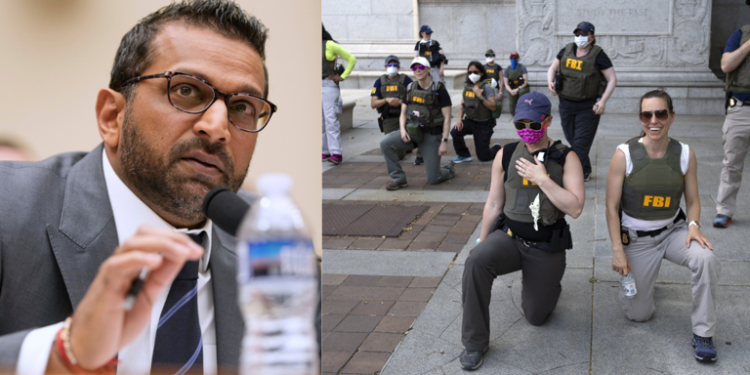The Federal Bureau of Investigation has dismissed a group of agents who were photographed kneeling during a 2020 Black Lives Matter protest in Washington, DC—a moment that sparked controversy then and is reigniting questions now about politics inside America’s top law enforcement agency.
According to the Associated Press, citing individuals familiar with the matter, roughly twenty agents were let go, though the exact number remains unclear. The FBI Agents Association confirmed in a statement that some agents were fired, and the group wasted no time blasting the decision as unlawful. “As Director Patel has repeatedly stated, nobody is above the law. But rather than providing these agents with fair treatment and due process, Patel chose to again violate the law by ignoring these agents’ constitutional and legal rights instead of following the requisite process,” the association said. They urged Congress to dig into the matter.
The incident at the heart of the controversy traces back to the summer of 2020, when protests swept the country after the death of George Floyd in Minneapolis. Some demonstrations turned violent, leading to rioting, arson, and widespread destruction of property across American cities. Washington, DC, became one of the epicenters, with federal monuments and government buildings at risk. During one protest, FBI agents tasked with guarding federal sites were confronted by demonstrators. Photos soon circulated of some agents kneeling in front of protesters—a gesture immediately interpreted by many as political.
At the time, questions swirled about why FBI agents were even placed in that position. As CNN reported, “FBI agents generally aren’t trained to do crowd control and deploying them to face off demonstrators raised fears of a possible deadly confrontation, current and former bureau officials said.” The optics of kneeling, however, carried more weight than questions about deployment. For critics, the image was a glaring example of the politicization creeping into federal institutions.
By April 2020, the bureau reassigned those agents, in line with then-President Donald Trump’s broader push to root out “woke” practices from the intelligence community. The recent firings appear to be the final chapter in a long-running internal battle over what standards federal law enforcement officers should be held to—and whether politics has any place in the process.
Director Patel, pressed at a congressional hearing last week, denied that the White House dictated the firings. He defended the bureau’s decision, saying those dismissed “failed to meet the FBI’s standards.” That statement underscores the fine line law enforcement agencies must walk: presenting themselves as neutral enforcers of the law while also avoiding any conduct that undermines public trust in their independence.
From a conservative vantage point, this episode highlights several broader themes. First, the danger of allowing activist movements to blur the responsibilities of government institutions. Federal agents kneeling may have been viewed by some as a harmless gesture, but for an organization tasked with upholding law and order, even the appearance of partisanship corrodes trust. Second, it raises the question of accountability. Were these dismissals the result of a clear, consistent policy, or were they influenced by the political winds swirling around the FBI at the time?
It is also a reminder of the lasting consequences of the unrest in 2020. The protests were not simply “peaceful demonstrations,” as much of the media portrayed. They left small businesses destroyed, law enforcement vilified, and federal institutions compromised. Now, years later, those ripple effects are still being felt—this time inside the FBI itself.
In the end, the firings reflect a clash over what it means for government agents to serve faithfully and without bias. Whether one sees the kneeling as an act of solidarity or a breach of professional conduct, the reality is that the bureau, and the nation it serves, must decide how much politics it is willing to tolerate in institutions meant to stand above the fray. For many Americans, the answer should be simple: zero.




















